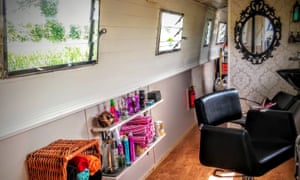
The Floating Salon Narrowboat, located nationwide, is run by Nicola Dawkins
The Floating Salon was a crazy idea I thought up to combine my love of the water and my love of hair styling. It’s a haven away from the high street.
Wherever I move the boat, it’s an advert in itself. I styled Prunella Scales’ hair for the Canal Journeys TV programme and that resulted in many calls over the months that followed.
I have to be organised and plan ahead: the boat runs completely off-grid with solar panels for lighting and the fridge and a small generator to power my hairdryer. There’s also a large water tank which has to be regularly filled from taps along the canal. A helpful by-product of running the engine when I move the boat between locations is hot water and I harvest this for washing hair. In winter it’s essential to keep well stocked with wood and coal as the boat is heated by a multi-fuel stove that keeps it warm and cosy.
My customers are a great mix of fellow boaters, local residents, tourists, dog walkers, cyclists and anyone who happens to use the towpath and walks by.
The Herb Boat travels nationwide and is run by Sue Cotton
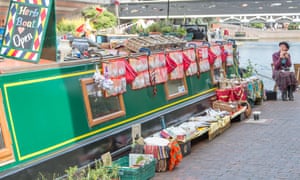
I’ve always been interested in plants, especially herbs. I wanted a nomadic lifestyle and needed an income so selling herbs and spices, both culinary and botanical, seemed like a way of bringing everything I love together. Once I’d decided to live on a boat, I realised I needed a business I could run while on the water and on the move; herbs and spices are quite light and compact and it was achievable within the very limited storage facilities available. That has actually become a positive, in that my stock base is small and regularly replaced so supplies are always fresh. I also sell herb plants, which live quite happily on my roof and always attract a lot of attention from passersby and bees.
Rain is a problem for all market traders, but the sun is more of a problem for me as it causes rapid deterioration of my stock. Deliveries can be a challenge, but I am lucky to have a wide network of land-based friends who let me use their addresses, and local pubs and boatyards are always very accommodating. I post where I’m trading on my website and Facebook pages and will sometimes put up posters in a town when I moor up.
Cafe on the Cut, based at Gloucester Docks, is owned by Vanessa Radwell
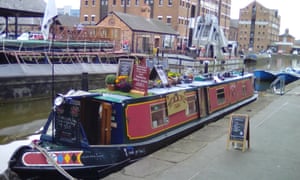
My sister planted the seed of the idea to set up a narrowboat cafe. Never one to dodge a challenge, I sold my small boat – I’ve lived on the water for 14 years – and got a 50-footer to live and work on. My family gutted her: the main challenge was that the mooring I’d been granted had no electricity, so four solar panels were fitted to run the lights, pumps and fridge. Not having much electric narrows down what appliances I can use, and our menu had to be designed to suit. There’s no freezer or microwave so the food is all made fresh and when we run out, it’s gone.
The main issue is kitchen space which means I have to shop daily, and me and the team are now a whizz at avoiding one another when cooking, serving and making drinks. It can be hard work getting rid of the rubbish and recycling and I have to be sure that the water tank is full enough for the washing up, because we have no mains water supply.
We serve cakes and lunches and, because I’m moored mostly in one location, people have got to know where we are. The first time I left the mooring a few people worried that I had disappeared for good, so now I put out a notice to say when I’ll be back or a “gone cruising” sign. I love that its so cosy inside and that people always end up chatting to one another.
Antiques Afloat is located nationwide and was set up by by Ali and Tim Smith
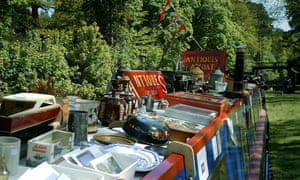
We’re up north at the moment on the river Weaver, heading to an event in Chester. From around Easter to autumn we get out on the waterways and make for a wide range of festivals and floating markets around the country. We had an established antiques business before trying out trading from our boat; once afloat, we discovered that a lot of people involved with canals are fascinated by history and want to buy objects that come from traditional old working boats, so we source and sell a lot of that.
Travelling around means we can also reach people using the towpaths for leisure who might not have thought they liked antiques, but find they love the jewellery and kitchenalia we stock that isn’t that expensive.
The weather can be tricky – very hot summers can stop you dead in your tracks if the canals are short of water – but there’s no doubt that selling off the boat has become the major strand of our business.
The Book Barge travels across the UK and France and is run by Sarah Henshaw
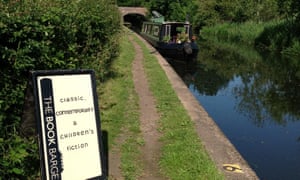
When I set up in 2009, lots of indie bookshops were closing so having a quirky premises seemed a good USP. Small retailers can flourish if they offer a different shopping experience and the opportunity to hop aboard a boat certainly does that. Running costs are arguably cheaper than a traditional high street premises – just a trading licence from the Canal & River Trust and, if you’re static rather than continuously cruising, a marina or mooring fee. There’s a certain flexibility that comes with retail on the waterways – the ‘if business is bad, move on’ logic.
Boat businesses like mine rely, to an extent, on the novelty factor to lure curious passersby, so stay in a place too long and that can disappear. The flipside is that moving between towns at 4mph takes time and fuel and days when you’re not taking any money at all.
Space limitations mean I’ll never be able to compete with the sheer range of stock available in other good bookshops, which means being incredibly selective, and adding value elsewhere, whether that be free cups of tea or a programme of events.
If you’re a live-aboard boater as I am, accommodating business and home in what’s effectively a 60ft corridor is tricky. Tidiness is key – as well as seeing the funny side when customers mistakenly believe personal effects are for sale, from your house plants to – once, very weirdly – a wrapped Christmas present under the tree.
Crafts Afloat, moored at Hebden Bridge, is run by Melanie Louise
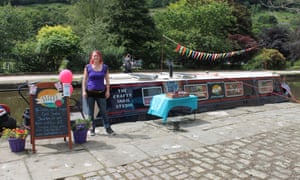
I love the lifestyle of living on a boat. In 2013 when I was keen to leave my job – I’d been teaching art in challenging schools and was pretty burned out – I started thinking about renovating a narrowboat as a small studio. The idea of doing art classes that helped people escape from their day-to-day stresses was appealing, and I felt that doing it on a narrowboat would increase the therapeutic nature of the experience.
I still teach part-time which takes the pressure off the business – it’s set up as a social enterprise – from having to provide me with a full income. My partner and I built the inside of the boat ourselves so it has been designed exactly how I wanted it. It runs fully off-grid, from solar panels, and I can power LED lighting, music and up to four sewing machines.
The main challenge is that the Canal & River Trust rules and regulations make life quite difficult for trading boaters. In Hebden Bridge, where I’m based, there are limited trading places, and many of these moorings have 24hr or 48hr limits on how long you can stay. I publicise my business through social media, mostly Facebook, I have quite a large following now and I find lots of people with stressful jobs come to do classes and unwind.
The Record Deck, located nationwide, is owned by Luke Guilford
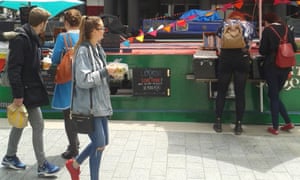
I’d owned my boat for 16 years and had been thinking about setting up the business for a while when I took the plunge in 2014. I’d been a vinyl collector since the age of 12 so it was about combining two passions: boats and music.
I’m able to operate with lower running costs than a regular shop, though boat newbies beware, that does depend on your DIY skills and available spare time, as fixing old boats needs care. There are lots of events, markets and festivals on the rivers and canals to attend and people say I definitely stand out from other record shops. I get to travel the country meeting fellow traders and travellers and there’s a fantastic sense of community that is rarely found elsewhere.
The British weather can make things tricky: if the weather is poor, folks aren’t out walking by the canals and, as I sell off the boat from hatches and shelves, I can’t set up if the weather is too bad. I’m a big user of social media to share where I’m going and tell people when I’ve arrived, using Facebook events, Twitter, Instagram and WordPress. The internet has really helped make this type of business more viable. It’s the old meeting the new.
[source :-theguardian]
